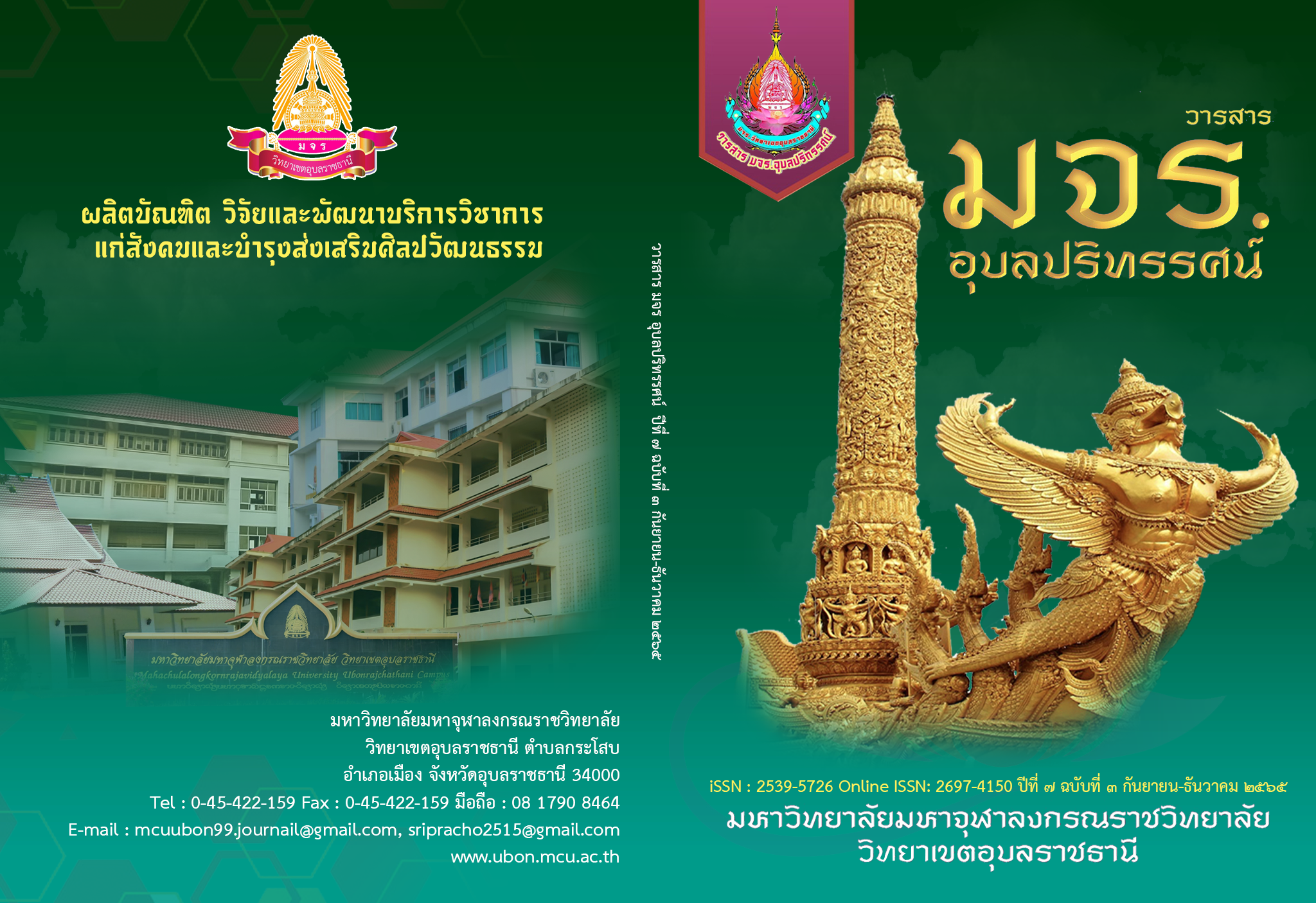FACTORS ASSOCIATED WITH HOTEL STAFF RETENTION IN BURIRAM PROVINCE
Main Article Content
Abstract
This study aimed to explore managerial factors, both the internal and external ones, associated with long-term retention of the hotel staffs in Buriram Province in which the findings were applied as a guideline for an effective management of hotel staff retention. Attentively, the researcher adopted a mixed research method in which the quantitative data was collected from the questionnaires provided to 225 hotel staffs and the qualitative data was derived from an interview with a group of 10 hotel executives in which the result analyzed by descriptive statistics to find frequency and percentage. Significantly, both external and internal managerial factors affecting the long-term retention of the hotel staffs in Buriram province were processed by descriptive statistics to find the mean score and standard deviation (S.D.); meanwhile, the research hypothesis were proved by t-test, paired comparison test, One Way ANOVA , and f-test. The study outcome indicated that the hotel staffs in Buriram were mostly female between 18-30 years old holding a bachelor degree and currently working as the back-office staff. Most of them have been working for at least 5 years and regularly earning 10,001 – 15,000 Baht per month. They were the locals living Buriram. In term of the internal managerial factors affecting a long-term retention of the hotel staffs, it was found that both single-sided and multi-sided factors were rated with highest scores in which the single-sided factor with the highest score was the organizational management. On the other hand, the external factors associated with the long term retention of the hotel staffs, both single sided and multi-sided, were rated with high score and the one-sided factor with the highest score was the advancement of technology. Apparently, the paired comparison test on the human resource management with the external/internal managerial factors and the individual factors indicated that all the factors, both single-sided and multi-sided ones, had different effects on the hotel staff retention with a 0.05 statistical significance. As a result, the guideline for human resource management to maintain a long-term retention of the hotel staffs should focus on: Career Path - an organization should build up pride in the workplace amongst the staffs so they could be motivated to show off their best performance to complete the assigned jobs; Organizational Interaction - all staffs should be allowed to participate in a process of goal setting, team working, and creating a good work-life balance; Organizational Management – the staff should be freely allowed to rotate their positions or be informed about the vacant position of their interest within an organization; Career Path – the staff participation should be broadly promoted to allow all staffs to fairly share ideas about their work and to be assigned with new challenging jobs; and Organizational Management– Operational plans and clear-cut job description should be well prepared for the staffs in all positions.
Article Details
References
ฉัฐวัฒน์ ลิมป์สุรพงษ์. (2564). ความสามารถในการปรับตัวของพนักงาน ที่ส่งผลต่อการเพิ่ม
ขีดความสามารถของพนักงาน ประสิทธิภาพของงาน ประสิทธิผลของงาน และความ
จงรักภักดีต่อองค์การ กรณีศึกษา บริษัท ดอยคำผลิตภัณฑ์อาหาร จำกัด. วารสาร
การบัญชีและการจัดการ มหาวิทยาลัยมหาสารคาม, 4(3), 64-83.
ณัฎฐ์พัชร์ ลาภบำรุงวงศ์. (2561). การจัดการทรัพยากรมนุษย์ในองค์กรให้ประสบผลสำเร็จ.
วารสารวิชาการมหาวิทยาลัยปทุมธานี, 10(2), 261-266.
ณัฐวุฒิ พงศ์สิริ. (2560). ผู้นำที่เรียกว่า Digital Leader ในยุคเศรษฐกิจดิจิทัล. HR Society
Magazine, 15, 172, 20-23.
ธนิตพงศ์ ไตรพัฒน์พัชร. (2552). การศึกษาผลกระทบจากปัจจัยสภาพแวดล้อมและปัจจัย
การแข่งขันในอุตสาหกรรมการส่งออกอัญมณีและเครื่องประดับของผู้ประกอบการ
ในกรุงเทพมหานคร. วารสารวิชาการอุตสาหกรรมศึกษา, 3(1), 86-94.
ธัญญารัตน์ พรหมสุทธิ์. (2564). การพัฒนาสมรรถนะทรัพยากรมนุษย์เพื่อรองรับยุคประเทศ
ไทย 4.0. วารสารวิทยาลัยสงฆ์นครลำปาง, 10, 228-243.
ธีระวุฒิ ตรีประสิทธิ์ชัย. (2557). ปัจจัยที่ส่งผลต่อการรักษาพนักงานให้คงอยู่กับองค์กรใน
อุตสาหกรรมการโรงแรมระดับ 5 ดาว ในกรุงเทพมหานคร. บัณฑิตวิทยาลัย :
มหาวิทยาลัยกรุงเทพ.
บุญชม ศรีสะอาด. (2553). การวิจัยเบื้องต้น. พิมพ์ครั้งที่ 8. กรุงเทพฯ: สุวีริยาสาส์น.
ปิยาพร ห้องแซง. (2559). การบริหารทรัพยากรมนุษย์ที่มีผลต่อความผูกพัน์ในองค์กรของ
พนักงานสาขาธนาคารออมสินในเขตกรุงเทพมหานคร. ปริญญานิพนธ์ ปริญญา
บริหารธุรกิจมหาบัณฑิต สาขาวิชาการจัดการ มหาวิทยาลัยศรีนครินทรวิโรฒ.
วีซานา อับดุลเลาะ. (2563). การจัดสภาพแวดล้อมการเรียนรู้เพื่อส่งเสริมทักษะการเรียนรู้ใน
ศตวรรษที่ 21 “แนวคิด ทฤษฎี และแนวทางปฏิบัติ”. วารสารมหาวิทยาลัย
นราธิวาสราชนครินทร์ สาขามนุษยศาสตร์และสังคมศาสตร์, 7(2), 227-246.
สำนักงานเลขาธิการ. (2562). นายกรัฐมนตรีประชุมหารือร่วมกับ สภาหอการค้าแห่ง
ประเทศไทย ปลดล็อกปัญหาด้านการท่องเที่ยว เร่งขับเคลื่อนการท่องเที่ยวไทย
เพื่อกระตุ้นเศรษฐกิจประเทศ. สืบค้นเมื่อ พฤษภาคม 2562. จาก https://spm.
thaigov.go.th/CRTPRS/spm-sp-layout6.asp?i=71111%2E5222370211
อภิวัชร ฉายอรุณ. (2564). ปัจจัยพฤติกรรมการทำงานเชิงรุกและปัจจัยแรงจูงใจในการ
ทำงานที่ส่งผลต่อความก้าวหน้าในอาชีพ ของบุคลากรมหาวิทยาลัยรังสิต.
วิทยานิพนธ์ ปริญญาบริหารธุรกิจมหาบัณฑิต สาขาวิชาบริหารธุรกิจ มหาวิทยาลัย
รังสิต.
Kossivi, B. et. al. (2014). The Factor of Turnover Intention in Hotel Industry. International Journal of Recent Research and Applied Studies, 21(1),
-38.

